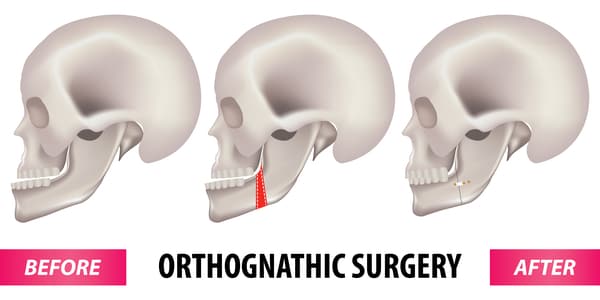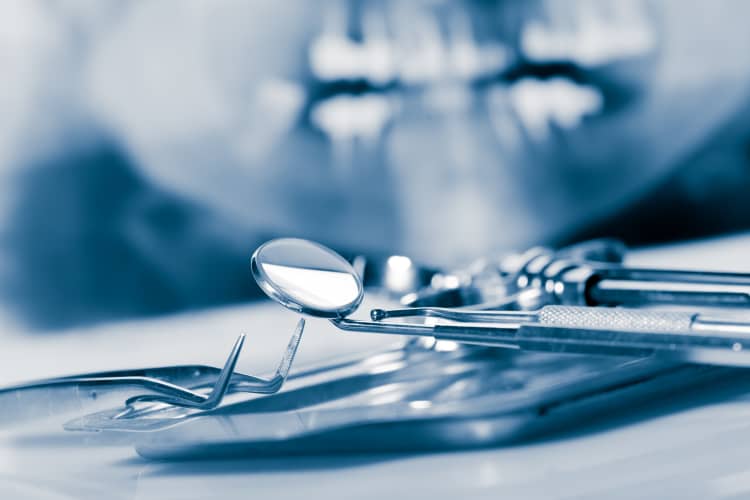_Human Session held on August 17, 2018.
_
Dr. Ho Kok Sen is an Oral & Maxillofacial Surgeon at Specialist Dental Group®.He has a special interest in dental implants, jaw surgery, bone grafting and complex extractions. He obtained his dental and specialty training in Oral & Maxillofacial Surgery from the National University of Singapore. He was also awarded the Lee Kuan Yew Gold Medal for being the best overall graduating student in his dental class.
Corrective jaw surgery is a medical procedure performed when there's a major skeletal and dental irregularity i.e. misalignment of jaws or teeth. While the patient's appearance may be enhance drastically, the procedure is performed to correct functional problems.
Dr Ho answered readers questions about:
- Who requires a jaw surgery
- Cost of jaw surgery in Singapore
- Types of jaw surgery
- Recovery process of a jaw surgery
Is getting jaw surgery worth it?

Hi Shiro, thanks for the D2D. An underbite (mandibular prognathism) is a type of dental misalignment (malocclusion) in which one’s lower jaw protrudes or extends further than the upper jaw.
Depending on the severity of the protrusion, an underbite affects a person functionally and aesthetically in the following ways.
Is jaw surgery painful?

Hi Ella,
Thanks for the D2D. I always ask my patients how they are feeling after the jaw surgery during our review sessions. The general feedback is that some discomfort is felt but overall, it is bearable.
This is possible because there are pain management measures in place during and after the surgery to help reduce the amount of discomfort felt throughout the process.
How is a jaw surgery performed?
Hi Zhong Hua,
Thanks for the D2D. As an oral & maxillofacial surgeon, jaw surgery is a very technical dental procedure that is under our dental specialty. Each successful case requires close teamwork and communication between an oral surgeon and orthodontist.
Your oral surgeon will first determine what type of corrective jaw surgical procedure is appropriate in your case. He/she is also the one carrying out the procedure.
I normally do a joint consultation with an orthodontist at our group practice for my patients so that they are clear of the entire process – orthodontics and surgery. During the consultation, a CT-scan and radiographs will be taken so that your dental condition can be correctly diagnosed.
What are the risks of jaw surgery?
Hi Rachela,
Thanks for the D2D. Jaw surgery is considered a safe and effective treatment for misaligned jaws. Nonetheless, as it is a surgery after all, there are risks in the short and long run.
The risks that may occur right after surgery includes:
- Bleeding – Minor nose bleeds may be experienced for one or two weeks after surgery on the upper jaw
- Swelling – Swelling usually becomes worse on the third day.
- Abrasion – As the surgery is done from inside your mouth, there might be abrasions at the corners of your lips. You may be given a medicated cream to apply or Vaseline works as well.
- Infection – This is possible after any type of surgery. A course of antibiotics and anti-inflammatory medication will be given to mitigate this.
- Numbness - After the surgery, some numbness or altered sensation is expected. It does not affect the appearance or function of the lips. The numbness subsides on the upper lip relatively quickly.
- Nausea – Feeling nauseous and vomiting are common after effects of general anesthesia.
- Jaw joint stiffness – This may take place for several months. The best way to overcome this is to exercise the muscles more by chewing.
How much does it cost to have a jaw surgery in Singapore?
Hi Lisa,
Thanks for the D2D. The cost of a jaw surgery in Singapore costs upward of $10,000. This excludes fees for pre and post orthodontics, anaesthetist, operating theatre, hospital admissions.
Jaw surgery is a highly technical procedure practiced by oral & maxillofacial surgeons.
How much can I claim from Medisave for jaw surgery?
Hi George,
Thanks for the D2D. As jaw surgery is a surgical procedure, Medisave can be used to cover part of the fees. The amount that can be claimed is from $5,000 onwards, depending on the complexity of the procedure and subject to the Medisave withdrawal limits.
Can jaw surgery fix a lisp?
Hi Petrina,
Thanks for the D2D. It is important to first find out the underlying cause of the lisp before suggesting any treatment option.
The most common type of lisp is frontal lisp, where the tip of the tongue protrudes between the front teeth and obstructing the airflow. There is also palatal lisp, where one rolls their tongue too far back and touches the roof of the mouth and dental lisp, where the tip of the tongue pushes against the teeth.
Are there any risks if I leave my protruding jaw alone?
Hi Feng Jiao,
Thanks for the D2D. Not proceeding with a jaw surgery does not bring about any risks per se, however it means that you may continue to face certain functional difficulties associated to a protruding jaw (underbite) such as:
- Inefficient biting and chewing
- Worn down tooth enamel, increasing susceptibility to tooth decay, sensitivity and other dental issues
- Chronic headaches and temporomandibular joint disorder
- Affected speech clarity
Will I be required to be hospitalized for my jaw surgery?
Hi Philip,
Thanks for the D2D. Yes, you will need to be hospitalised for at least a night after your jaw surgery.
The exact duration of your stay depends on the extent of surgery and your personal speed of recovery. In most cases, patients tend to be discharged after two to three days.
What is the recovery process like after a jaw surgery?
Hi Mei Hwa,
Thanks for the D2D. Initial recovery from the surgery (e.g. healing of incision, reduction in swelling/bruises) takes about four to five weeks, while complete bone and nerve healing takes about nine to 12 months.
During recovery, here are a few important things to take note of:
- Bleeding: this may be observed in the mouth (operation site) or nose for up to two weeks, this should not be any cause of concern. However, if you find that the bleeding is excessive, do inform your oral surgeon know.
- Diet: liquid diet for first three weeks > non-chew food for the next three weeks > soft-chew diet for another two weeks > resume normal chewing food only after eight weeks from jaw surgery
- Exercise: avoid any vigorous activity for four to six weeks and have minimal activity in the first week
What are the steps I should take to ensure a successful jaw surgery?
Hi Chai,
Thanks for the D2D. Listen to your orthodontist and oral surgeon, they know your dental condition and are the best people to guide you along the process.
During the pre- and post-surgery orthodontic treatment, maintain good oral hygiene so that there are no additional dental issues. If you are wearing Invisalign, be disciplined in wearing your aligners for the recommended time so that your treatment can progress in a timely manner. If you are a smoker, it is best to stop smoking.
What are the complications I should take note of after jaw surgery?
Hi Dahlia,
Thanks for the D2D. Jaw surgery is generally a safe procedure and serious complications arising from the surgery are not common. You can refer to this question: “What are the risks of jaw surgery?”, for the list of short and long term risks of a jaw surgery.
Immediately after the surgery, bleeding, swelling, soreness and numbness is expected. These are not complications.
How can I find the best oral surgeon for my jaw surgery?
Hi Yong Jia,
Thanks for the D2D. If you are already visiting a dentist, you may ask him/her for a recommendation for a Dental Specialist in Oral & Maxillofacial surgery (oral surgeons).
Oral surgeons are dentists who underwent further training for procedures that are related to the mouth, teeth, face and jaws (e.g. dental implant placement, jaw surgery).
Alternatively, recommendations from friends and family are a good way to start. You may also take advantage of the internet to search for an oral surgeon. Important things to look out for will be his/her training and qualifications and the number of years of experience in treating similar conditions.
Ever wanted to ask a health question to a specific renowned specialist in Singapore? Human Sessions are when these expert doctors answer all your questions!
View the complete list of upcoming Human Sessions here.














